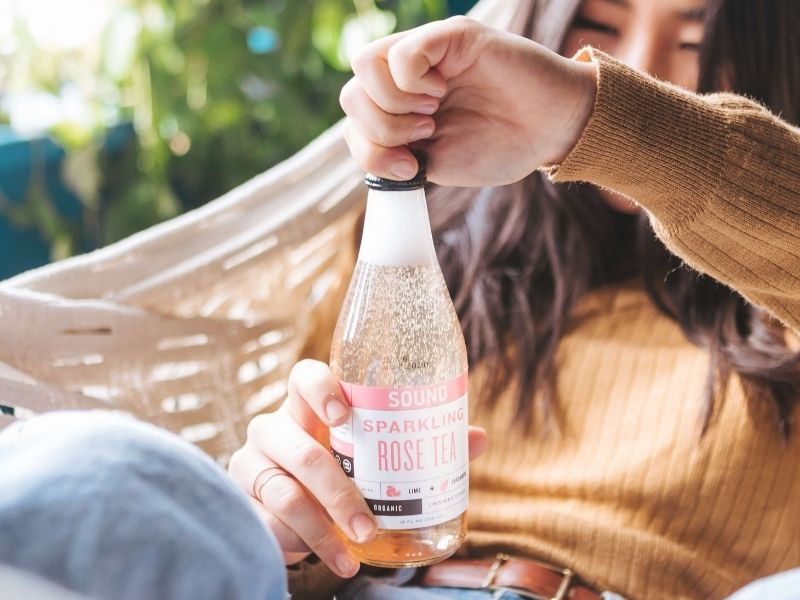When people decide to be more proactive about their health, usually one of the first things they re-examine is their diet and nutrition, trying to find places where they can choose healthier alternatives to their old favorites. Juice, soda, and other sugary drinks are often the first things to go, replaced by seltzer water. And that’s often a great thing.
When you drink seltzer water (ie, carbonated water) every day, you will stay hydrated and possibly reap other health benefits. Water is generally always a better choice than sweetened beverages. That said, women with overactive bladder and/or sensitive bladders may want to reduce the amount of seltzer water they are drinking.
So let’s jump into the basics of carbonated water and your health.
The Benefits Of Drinking Seltzer Water Daily
Staying well hydrated is critical to good health. So if you’re more excited (and therefore more likely) to drink seltzer water, then great. Soda water has no calories, caffeine, or artificial sweeteners, so it’s naturally a better choice than many other drinks out there. In general, swapping out less healthy drinks for carbonated water is often a great choice.
And there may be some particular benefits to sparkling water. Some studies have shown that carbonated water can help reduce constipation and some types of indigestion. It may also help with appetite suppression and thus weight loss. 1
Another study suggests that carbonated water may be actually more hydrating than tap water, because it contains more electrolytes.1 Does seltzer water have electrolytes? It appears so. In a study comparing different beverages, researchers conducted electrolyte analysis to determine how well a drink re-hydrated people after exercise. Drinks with potassium chloride and sodium chloride—both commonly found in sparkling water—appeared to hydrate better than beverages that did not.1
Seltzer Water & Your Bladder: Potential Drawbacks
Despite its potential benefits, seltzer water may not be the best choice for everyone. This is especially true if you have overactive bladder.
Overactive bladder is a combination of issues that can affect the bladder. People with the condition primarily experience frequent, sudden urges to urinate. They may also urinate involuntarily, which is called incontinence. It’s a treatable condition, but many women suffer in silence, often because they believe harmful myths about incontinence. This is unfortunate, since overactive bladder can have a big impact on your mental health and quality of life.
And unfortunately for all you soda water addicts out there, what should be a healthy ‘addiction’ may actually be making your overactive bladder worse. That’s because carbonated drinks (including carbonated water) can irritate sensitive bladders.2
In fact, one study found that for middle-aged women, drinking one carbonated beverage a day can double their risk of stress incontinence.3
So does that mean you have to give up soda water completely? Not exactly. If you search La Croix pelvic floor, you’ll find advice from Alicia Jeffrey-Thomas, DPT, CLT, a pelvic floor physical therapist in Boston, who recommends keeping carbonated water to just 25% of your daily water intake.4
Does sparkling water make you pee more? Sparkling water contains dissolved carbon dioxide which results in an acidic solution and may increase urinary urgency.5
If you have an overactive bladder or believe sparkling water may be making you feel like you’ve ‘got to go’ too much, then try reducing the amount you drink, or even eliminate it for a while. Then, you can slowly reintroduce it and monitor your symptoms.
The contents of your bladder are not just from fluids—your urine is made up of the liquid waste that the kidneys filter from your blood. That means there are traces of the foods and drinks you consume stored in your bladder. Some foods may actually irritate your bladder. So if you’re asking, does sparkling water make you pee more? You may also consider that some foods may make overactive bladder symptoms worse. Try eliminating some trigger foods and see if it helps—things like sugar and artificial sweeteners, honey, chocolate, tomatoes and tomato-based products, and more.
And remember that while hydration is critically important to your health, everyone’s fluid needs will differ, and they’ll change from day to day. And according to Dr. Daniel Gruber, urogynecologist from Sibley Memorial Hospital in Washington D.C., part of John Hopkins medicine, “I see a lot of patients who over-drink, in my opinion, and that causes a lot of bladder problems. They’re going to the bathroom every 30 minutes or 45 minutes and it’s very disrupting to their day and especially at night for sleep.”
So learn whether you actually need 8 glasses of water a day here, and learn more ways to control your bladder here. And remember that there are lots of other healthy ways to stay hydrated, too. A yummy green smoothie each morning may be a great place to start.
And if you suspect you may have an overactive bladder, don’t suffer in silence. Speak to your doctor, or use our Physician Finder to find a pelvic floor specialist in your area.
















